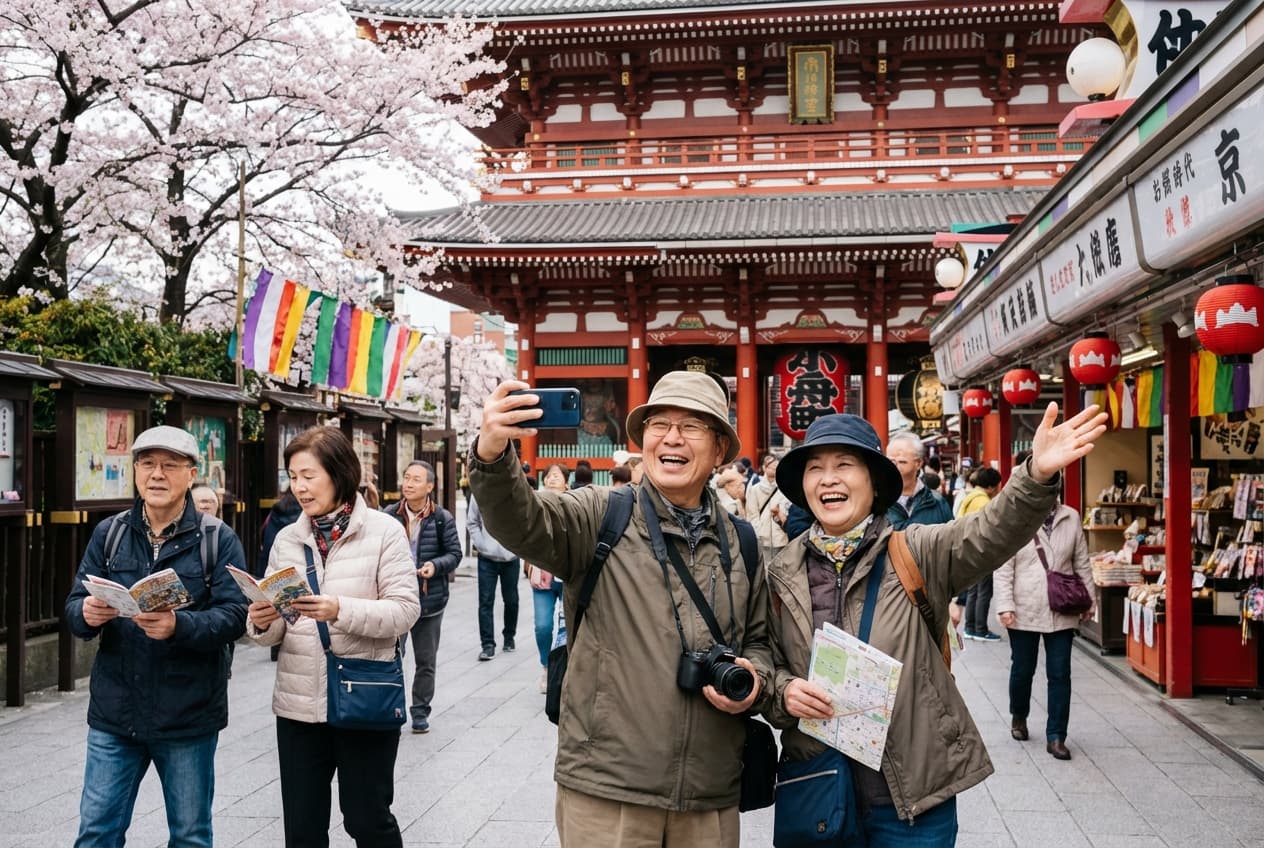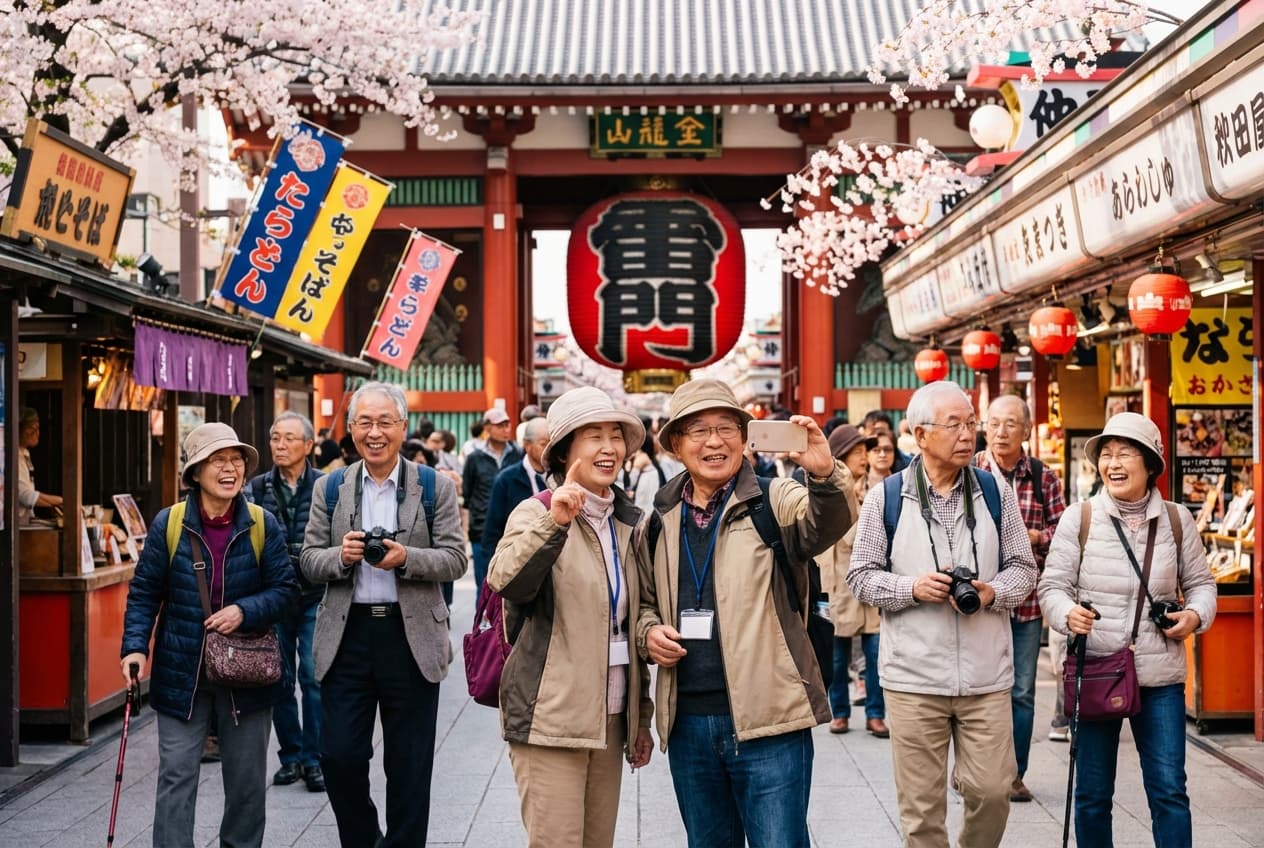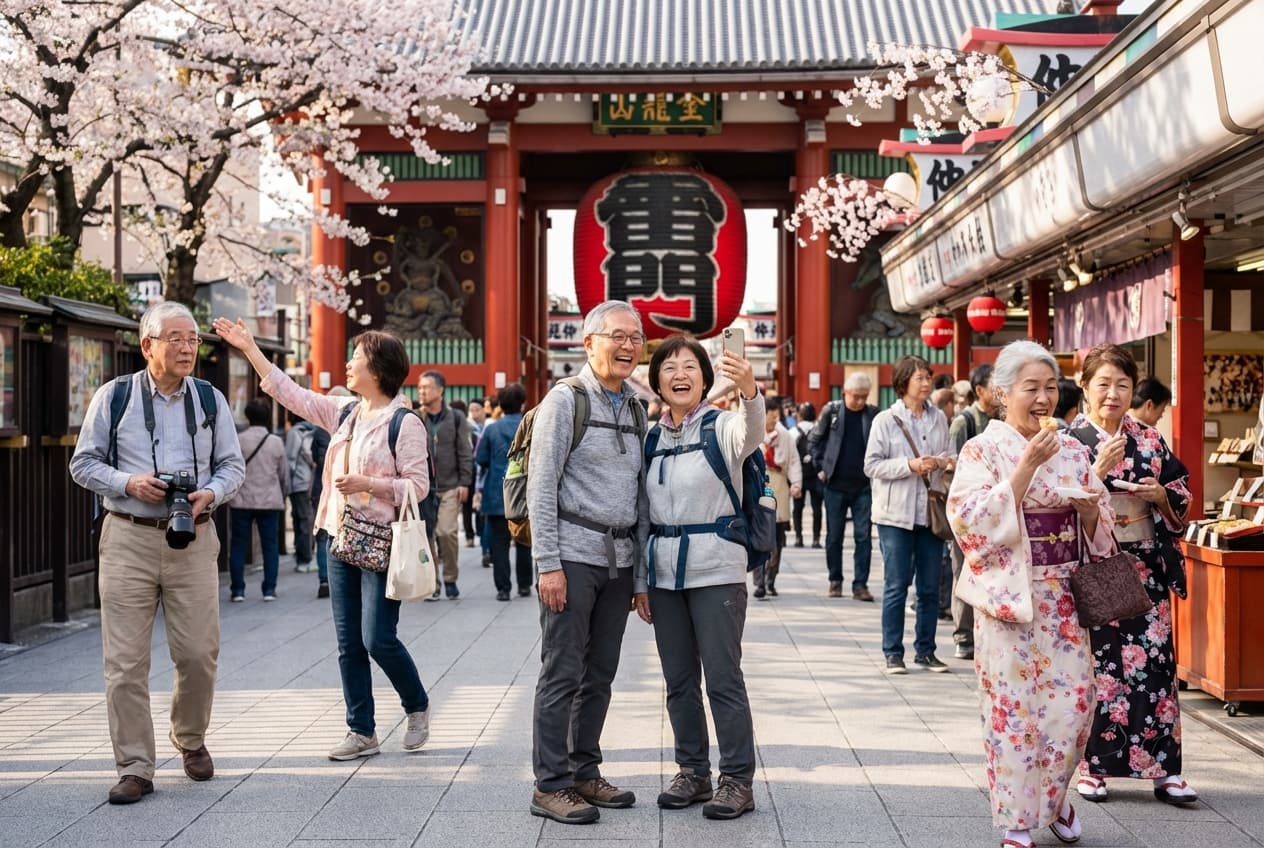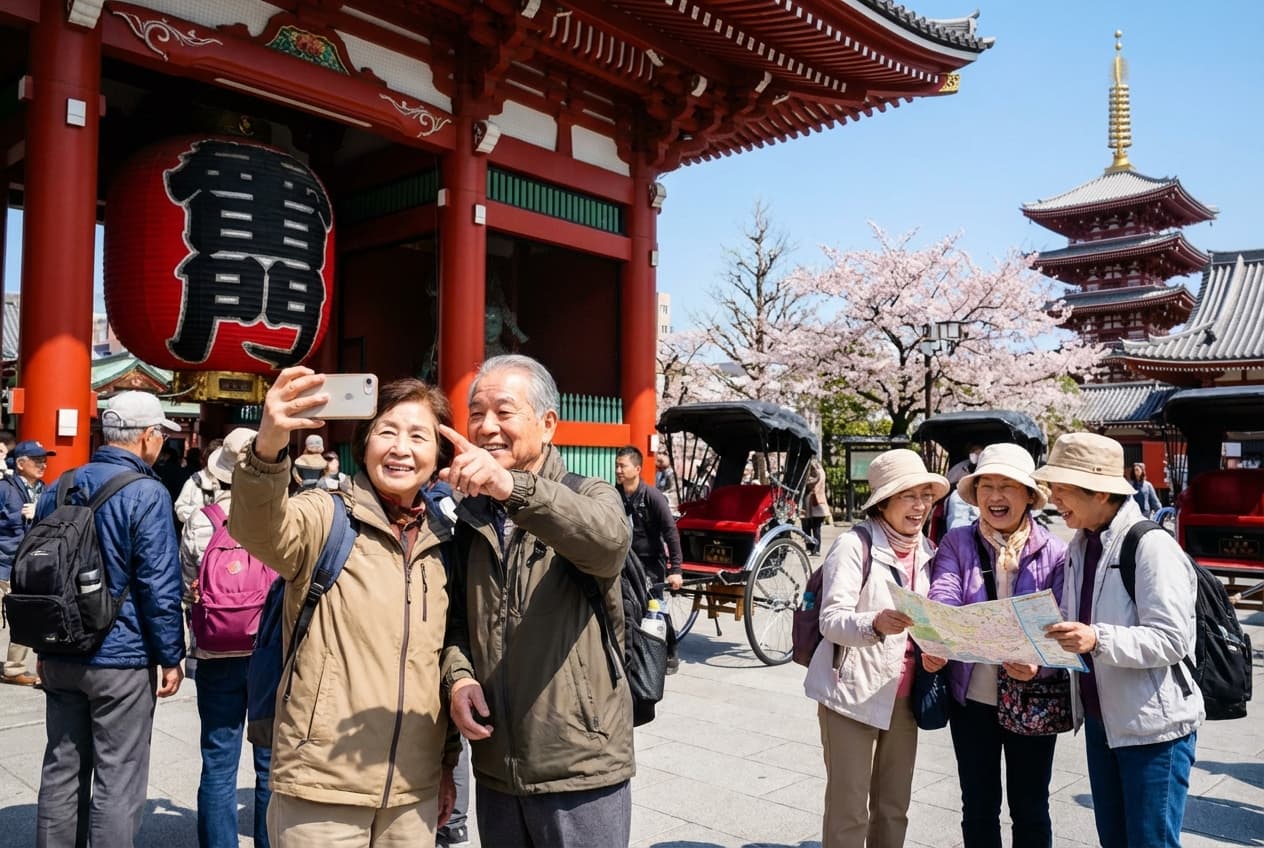Tokyo in 4 Days for Seniors - Autumn maple and ginkgo colors in classic Tokyo gardens
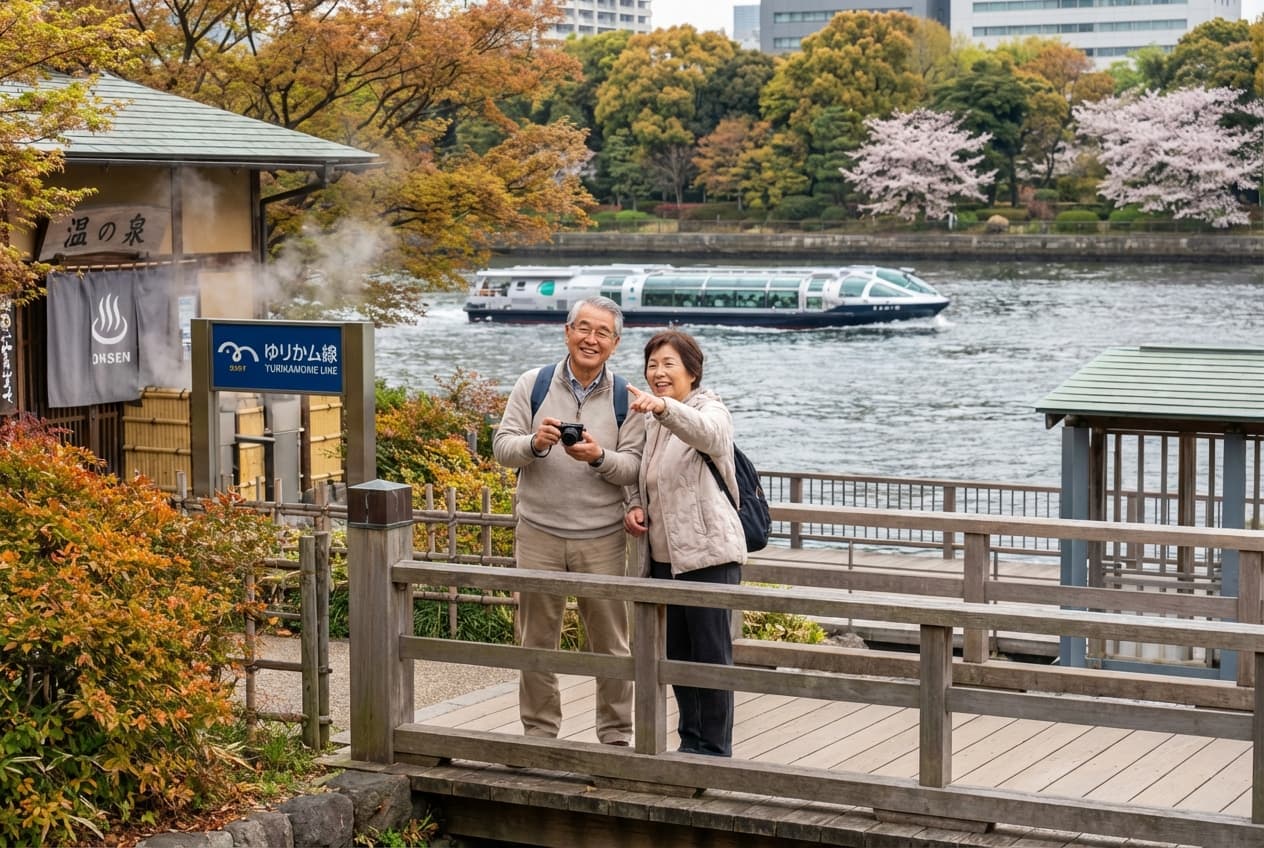
A calm, accessible 4-day Tokyo itinerary for seniors in November (Autumn). Each day balances gentle garden strolls, restful meals, short transfers, and two relaxing onsen visits. Pace is unhurried with frequent breaks, step-free options, and seating suggestions.
Highlights
- Autumn maple and ginkgo colors in classic Tokyo gardens
- Two accessible onsen/spa experiences (Thermae-Yu and Spa LaQua)
- Short, low-stress transfers via taxi or water bus
- Frequent rest breaks and calm hotel/restaurant dining
Itinerary
Day 1
Classic northern-Tokyo gardens close together: Rikugien then Kyu-Furukawa, with a gentle local shopping street in the late afternoon. Plenty of benches and short transfers.
Morning: Rikugien Garden — gentle autumn stroll
Wide, flat paths and classic pond-and-maple scenery. Best in the morning light for colour and quieter paths.
Tips from local experts:
- Accessibility: Main entrances are step-free; there are paved, mostly-flat routes and accessible restrooms near the entrance — request the park attendant for the easiest route map.
- Crowd & timing: Visit early (open at 9:00–9:30) to avoid peak photographer groups; benches are spaced frequently — sit to enjoy views rather than walking long continuous loops.
- Transfer tip: Use a short taxi from Komagome Station (2–5 minutes) to minimize steps and walking; discuss the exact gate name with the driver (Rikugien main gate) to be dropped at the closest entrance.
Late morning: Kyu-Furukawa Gardens — a compact Western/Japanese mix
A short taxi or relaxed walk from Rikugien to Kyu-Furukawa Gardens, with a pleasant mix of rose terraces and a Japanese strolling garden — great for autumn tones and photos.
Tips from local experts:
- Accessibility: The Japanese garden section is mostly level; some terraces have steps — stay on the main paved circuit for the easiest route; accessible toilet located near the entrance.
- Seating & shade: There are fewer benches than larger parks; plan to sit at the entrance area or nearby café after your visit to rest.
- Transit & pacing: The gardens are compact — keep your pace slow and allow extra time for photo stops (and to catch breath); Komagome Station has elevators (use the north exit).
Lunch: calm hotel dining at Hotel Mets Komagome
Easy, accessible hotel restaurant seating near Komagome station — quiet midday atmosphere and elevator access.
Tips from local experts:
- Accessibility: Hotel restaurants have elevator access, level entrances and wheelchair-accessible restrooms — mention mobility needs when booking a table.
- Diet & comfort: Ask staff for low-salt or gentle menu options and request a table away from busy corridors for a quieter meal.
- Reservation & timing: Reserve a table for just after the morning garden visit to avoid waiting; staff can help with taxi calls if you want a short ride back to the hotel afterward.
Mid-afternoon: Rest / light hotel break
Return to your hotel or nearby resting spot for a seated rest, hydration and to change layers — November can be crisp and evenings cool.
Tips from local experts:
- Comfort: Bring or request an extra blanket from the hotel if you feel chilly after walking — onsen visits later may be more comfortable warmed up.
- Health: Use this time to hydrate and use accessible facilities; elevators and wide corridors in Japanese business hotels make movement easy.
- Pacing: Keep this rest to 60–90 minutes to avoid stiffness but maintain an unhurried day rhythm.
Late afternoon: Sugamo Jizo-dori — gentle shopping street for seniors
Known as a friendly, low-key shopping street favored by older Tokyo residents — shaded sidewalks, simple snacks and plenty of places to sit.
Tips from local experts:
- Step-free route: The shopping street has broad, mostly-flat sidewalks with frequent shopfront seating and public benches — ideal for short, comfortable strolls.
- Local snacks & seating: Try a warm, soft sweet (e.g., 'suiton' or sweet potato snacks) from a vendor and sit on a bench rather than queueing for standing food.
- Safety & planning: Bring a small umbrella for wind chill, and consider taking a short taxi to and from the street to avoid unnecessary transfers on foot.
Early dinner: calm hotel restaurant (nearby)
A relaxed, early dinner back at the hotel or a nearby quiet restaurant to end the first day gently.
Tips from local experts:
- Early seating: Opt for an early table (around 18:00) when restaurants are quieter and staff can be more attentive to mobility or dietary needs.
- Quiet corner seating: Request a table in a quiet corner or by a window to minimize noise and allow comfortable conversation.
- Transport: If your hotel is a short taxi away, ask the restaurant to call a taxi so you avoid crowded station platforms.
Day 2
Shinjuku's large green lung in the morning, followed by an accessible, restful onsen experience in the afternoon (Thermae-Yu). Plenty of seating and hotel dining for calm meals.
Morning: Shinjuku Gyoen National Garden — roomy, paved pathways
A large, varied garden with wide lawns and benches — excellent for autumn colours and gentle walking with many toilets and sheltered spots.
Tips from local experts:
- Accessibility: Major entrances have step-free access and wide paved paths; accessible restrooms are available near main gates — take the easiest circuit rather than the whole park.
- Seating & shelter: There are cafés and benches dotted through the garden for frequent rests; the greenhouse has seating and is a good sheltered stop if it's windy or cool.
- Crowd & timing: Visit mid-week or early morning to avoid weekend crowds; bring a light layer — November mornings can be crisp but sunlit.
Lunch: hotel dining at Keio Plaza Hotel — accessible, calm
Hotel dining with elevators, accessible toilets and quiet seating options — a restful place to refuel before an onsen visit.
Tips from local experts:
- Reservation: Reserve a table and mention mobility needs — hotels typically offer step-free seating and assistance with carrying trays if needed.
- Meal choices: Ask for lighter menu options or low-salt dishes; Japanese hotel restaurants are used to accommodating dietary needs.
- Accessibility: The hotel lobby and restaurants have level entrances and elevators — if you brought a wheelchair, staff can guide you to the most convenient route.
Short rest: hotel lobby or private room
A brief seated rest and a chance to change into comfortable clothing before the spa visit.
Tips from local experts:
- Hydration & warmth: Have a warm drink and a light snack if needed to maintain energy for the spa; November afternoons can cool quickly after sun-down.
- Facility access: Use hotel elevators and accessible toilets before leaving — spa entry often requires using small lockers and changing rooms.
- Timing: Keep this break 20–30 minutes so arrival at the spa is relaxed but not rushed.
Afternoon: Thermae-Yu (Shinjuku) — accessible onsen & rest lounges
A well-equipped urban onsen with elevators, private rest rooms and day-spa options. Ideal for seniors who want a supervised, comfortable hot-spring experience.
Tips from local experts:
- Accessibility & privacy: Thermae-Yu has elevators, wide corridors and private 'tatami' rest rooms you can reserve — ask staff about private changing areas if standing in communal changing is difficult.
- Wet-surface caution: Staff can assist with steps in and out of bathing areas; take your time and use available handrails — onsen floors can be slippery when wet.
- Etiquette & comfort: If communal baths are a concern, reserve a private rest space (or private family bathing where available) and go during early afternoon off-peak hours when it is quieter.
Early evening: gentle dinner at hotel or nearby restaurant
A short, calm meal close to the hotel to finish the day without extra transfers.
Tips from local experts:
- Early meal time: Aim for 17:00–18:00 to avoid rush; staff will be more attentive and the atmosphere quieter.
- Seating request: Ask for a low table or chair seating if getting up from floor seating is difficult; Japanese restaurants often offer both options.
- Transport: Take a short taxi home after dinner if the walk to your hotel feels long — taxis are abundant in Shinjuku and useful for avoiding stairs.
Day 3
Central Tokyo: Imperial Palace East Gardens in the morning, water-bus transfer and a calm tea interruption at Hama-rikyu in the afternoon, followed by a relaxing Ginza evening.
Morning: Imperial Palace East Gardens — historic, level walking
A tranquil, historic garden with flat paths and quiet corners. Easy to navigate with accessible entrances and benches.
Tips from local experts:
- Step-free access: Use the Otemon or Marunouchi gates (both have step-free approaches) and ask guards for the most accessible route map on arrival.
- Seating & shade: Benches are found along the main circuits — plan short rests every 15–20 minutes to keep walking comfortable.
- Taxi drop-off: A short taxi ride to the entrance reduces walking from major stations; taxis can be faster and more comfortable than crowded trains midday.
Lunch: KITTE Marunouchi — accessible food floor with calm cafés
A modern shopping/restaurant building by Tokyo Station with elevators, accessible toilets and several quiet cafés with views.
Tips from local experts:
- Accessibility: KITTE has step-free access and elevators to restaurant floors; choose a cafe with window seating for sunlight and fewer steps.
- Quiet options: Ask for a table away from the main corridor; weekday lunchtimes are calmer and staff are used to assisting mobility needs.
- Light meals: Choose warm soups or set meals that are easy to eat and gentle on digestion before the water-bus ride.
Transfer: short Tokyo Cruise water-bus to Hama-rikyu
A gentle, seating-friendly boat ride along the river offering views and minimal walking between dock and garden — a pleasant, low-effort transfer.
Tips from local experts:
- Boarding help: Tokyo Cruise crew can assist passengers boarding from low piers — ask for assistance to avoid steps and time your departure for a seat.
- Seating & views: Choose a forward window seat for the warmest sun in November; keep a light jacket for breezy river air.
- Tickets & timing: Buy a reserved seat if available or arrive early at the pier to secure level boarding; discuss transfer timing with your hotel concierge if needed.
Afternoon: Hama-rikyu Onshi Teien — harbour garden & tea house
A waterfront, Edo-era garden with paved paths, a teahouse on an island (Nakajima no Ochaya) and easy benches — excellent in November light with city skyline views.
Tips from local experts:
- Accessible routes: Paths from the water-bus pier to the garden are paved and mostly level; the garden staff can advise the easiest loop to avoid steps.
- Tea house seating: Nakajima no Ochaya offers seated tea service — request a chair option (if available) or ask staff to help with a low-step entrance.
- Benches & shelter: Use benches on the outer paths for resting and enjoying skyline views; bring a small seat cushion for colder days if you prefer.
Evening: Ginza stroll and early dinner
A relaxed Ginza walk—wide sidewalks and department-store restaurants with accessible seating make for a comfortable evening.
Tips from local experts:
- Accessible dining: Ginza department stores (e.g., Ginza Mitsukoshi, Ginza Six) have restaurant floors with elevators and accessible toilets — ask for quieter seating when booking.
- Short walks: Keep walking to short blocks between shops; many department stores have benches and rest areas on upper floors.
- Dinner timing: Aim for an early dinner (around 17:30–18:30) to avoid crowds and get attentive service.
Day 4
A final day near Tokyo Dome City: Koishikawa Korakuen garden in the morning followed by a long, leisurely spa session at Spa LaQua and gentle shopping/rest before departure.
Morning: Koishikawa Korakuen Garden — compact, level historic garden
One of Tokyo’s oldest Japanese gardens, near Tokyo Dome. Paths are well-kept and pleasant for short, contemplative walks in the November colours.
Tips from local experts:
- Easy circuits: Stick to the main paved circuit for the gentlest walking; there are frequent benches and accessible toilets near the entrance.
- Proximity: The garden is a short taxi or elevator-accessible walk from Iidabashi or Korakuen stations — choose a taxi if weather is cool or if steps are a concern.
- Autumn colours: Late November brings many maples into peak colour — pick a bench facing the pond for a restful viewing spot.
Lunch: The Tokyo Dome Hotel — accessible, early seating
A calm hotel lunch close to the garden and the spa area, with elevator access and restful seating.
Tips from local experts:
- Accessible seating: Hotel restaurants have wheelchair-friendly layouts and staff used to helping guests with mobility needs — request assistance when booking.
- Early lunch: Aim for 11:15–12:30 to keep the rest of the afternoon free for the spa and to avoid queues.
- Light options: Choose warm set meals or soups that are easy to digest before a spa visit.
Afternoon: Spa LaQua — natural hot springs and restful lounges
A comfortable urban onsen at Tokyo Dome City with elevators, private rest areas and a range of温浴 (bathing) and lounge options — ideal for a longer, gentle soak.
Tips from local experts:
- Private & accessible options: Spa LaQua offers private rest spaces and elevators to all levels — ask reception about reserving a private rest room if communal changing is difficult.
- Safety & pacing: Use handrails when entering baths and alternate hot and warm areas slowly; staff can assist if balance is a concern.
- Advance booking: Book an afternoon slot (13:00 start) on a weekday to enjoy quieter pools and prompt staff attention; bring flip-flops for walking in changing areas.
Late afternoon: gentle rest, café or light shopping at Tokyo Dome City
A calm finish to the trip — seated café time, souvenir browsing near Tokyo Dome City’s covered walkways and accessible shops.
Tips from local experts:
- Seating & shade: The LaQua and Dome City complex have many indoor cafés with level access and accessible toilets — choose a spot with a view of the plaza to relax.
- Souvenir choices: Department store gift floors have elevators and offer small, light souvenirs that are easy to carry home or ship from the store.
- Transport planning: If leaving Tokyo that evening, use hotel/taxi booking services from the Dome area to arrange comfortable, step-free transfers to the station or airport limousine bus.
Early farewell dinner: calm hotel or LaQua restaurant
A final early dinner close to your accommodation or the Dome complex, chosen for easy seating and a quiet atmosphere to finish the trip gently.
Tips from local experts:
- Early booking: Reserve an early table (around 18:00) to ensure calm service and easy movement after the meal.
- Accessible seating: Mention mobility or hearing needs when booking (e.g., quieter corner, chair seating instead of floor seating).
- Transport: After dinner, use a taxi with assistance if you have luggage or if train connections are crowded — hotel desks can call one for you.
Itinerary Attributes
| Days | 4 |
| Highlights | 4 |
| Season | - |
| Month | - |
| Persona | Seniors |
| Transfers | 1 |
| Restaurants | 7 |
| Total Activities | 20 |
| Total Places | 20 |
| Activities Types | Attraction, Meal, Break, Neighborhood, Experience, Transfer |
